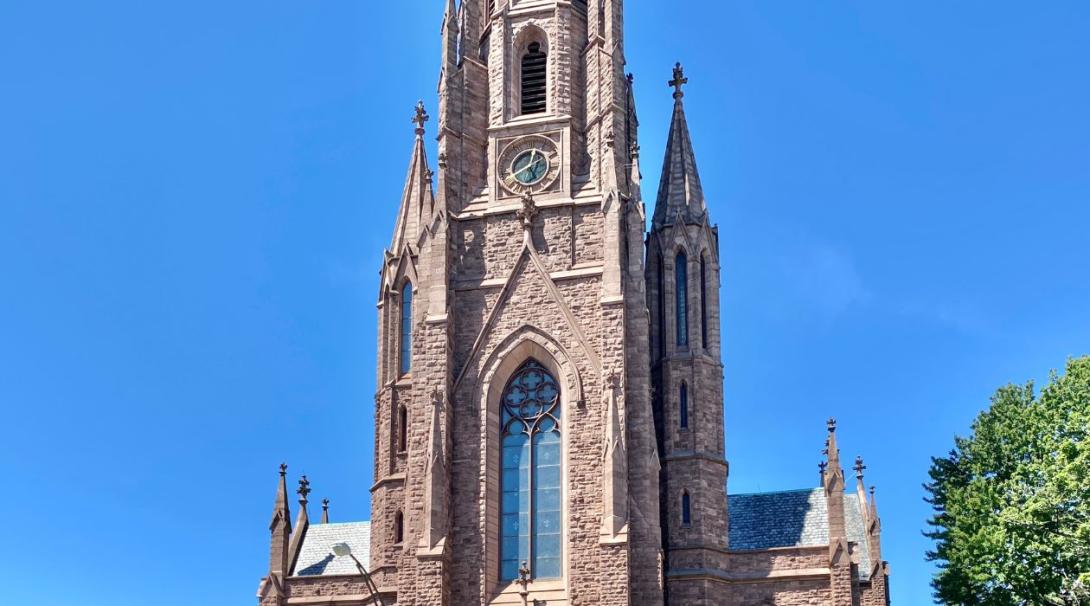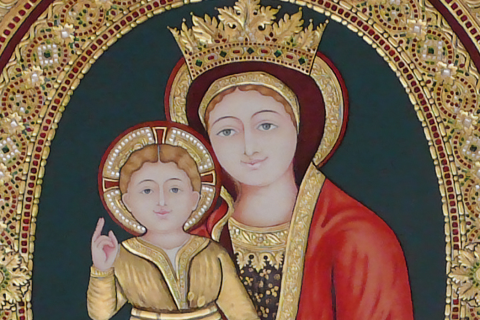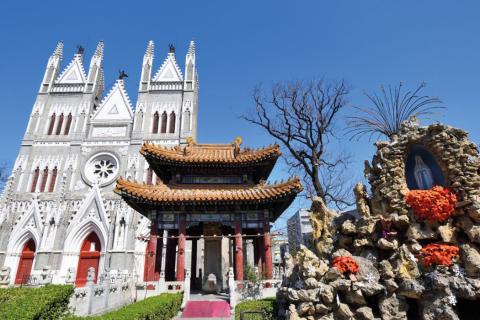
St. Louis, Roman Catholic Church, Main Street
From the rise of White Christian Nationalism to France’s refusal to allow female Muslim Olympians to compete while wearing a sports hijab, we have lots of data to suggest that religion and politics are once again becoming the kinds of topics we’re not supposed to discuss in public.
But as we all know, silence is rarely a remedy for social and political tension. Often it is only more conversation—civil discourse within civil society—that can help us find our way through a minefield. For better or worse, as both a sociologist and a Jesuit priest, it’s often part of my job to help us have these conversations. In particular, I often find myself trying to help Catholics of all stripes, from laity to the hierarchy, understand what kind of public, political role our Church might play in times like ours. And often this conversation turns to helping us understand why it is that we think that silence—taking religion out of the picture—will help us get along better.
The hard part about these conversations is that understanding why silence seems logical involves doing some hard thinking—thinking that is both historically and theoretically demanding. Let me try to lay that out here, very briefly, before saying something more explicit about the public role of the Church in our times.
Regardless of what name we give it—postmodern or secular or liquid or fragmented—one of the ways we can understand our times is to take note of a major change in the way we live together in community. For much of human history people lived close by those with whom they shared a religious identity. The thing that linked us to our neighbors was that we worshiped the same God (or gods) together. But one of the things that has happened in recent history is that our communities are now bonded less by religious identity than by the nation state. This is just to say that what we share with our neighbors now is citizenship in a state, not membership in a denomination. It’s that we all have one vote (or can vote) that binds us.
Of course, this transition in the form of our communal bond did not happen quickly or peacefully. And often it was religious groups—of course I am gliding over an enormous amount of historical contingency and theoretical nuance here—that most resisted the transformation of this “master identity.” Nevertheless, willingly or unwillingly, over the last two hundred years nearly every major religion has made this transition such that now most world religions not only accept but celebrate the fact that human beings now live together in a multicultural, religiously diverse, community called the nation state. (Indeed, in many accounts it was the Catholic Church that was the last to make this transition from state religion to “public religion.”)
But with this transition in community form, a new question arises for religious communities like the Roman Catholic Church: is there any public thing, any political-vocational task, for which we are still responsible? Is there anything we ought to do now, or is it just the case that we ought to retreat to the quiet of the private sphere, remaining silent so as not to ruffle feathers in public or disturb the course of politics?
Often it is only more conversion—civil discourse within civil society—that can help us find our way through a minefield.
My contention, for which I am able to argue here only briefly, is that even in our times, after having accepted disestablishment, the Church still has a very important political role. In fact, I am of the opinion that the Church needs to think much more deeply, and take much more seriously, its role as a public, political agent—an agent, that is, of a particular kind.
There are many reasons for this. Theologically—and speaking here only for Catholics—one of these reasons is that we ought to take seriously the idea that God continues to ask us to be, in some mysterious way, one of those fragile means through which he continues to save the world. Of course, we need not insist that we are the only such vessel, but I think it essential that we remember that the Church is less a collection of individuals than a corporate body—the Body of Christ—through which God is acting to help bring about something like the Kingdom. And if that is the case, then another question follows hot on its heels: just how are we supposed to do that?
We can begin to answer by thinking historically, by recalling how it is that our ancestors have answered such a question in the past. Doing so can help us remember, as the Anglican theologian Oliver O’Donovan argues, that for the first three centuries of its existence the Church understood its public, political activity under the theme of martyrdom. At that time, it was our individual and corporate willingness to publicly witness (which, of course, is the meaning of the word “martyr”) to another way of life through which we helped God bear forth the Kingdom.
But that theme was not to remain forever. After the Edict of Milan in 313, the Constantinian Church came, over time, to understand its political role in a different key. Then it became not martyrdom but governance that guided us. The public task of the Church in that age was, in different ways, to aid in governing the world.
But again, this task was not perennial, but instead for a time. And with the acceptance of the independence of a secular state and the disestablishment of the churches we are faced with the same question that confronted our ancestors: what kind of public, political action will best help the Coherent Mercy we call God to bring about the Kingdom of perpetual peace? Under what terms can we understand our role?
We do have some firm ground to stand on—we know, for example, that our role is no longer to attempt to govern by signing concordats with nation states such that all citizens are, willingly or not, members of a single religious confession. But the truth is that, like many of the churches, our beloved Roman Catholic Church does not yet have a univocal answer. It is this uncertainty that can tempt us to withdraw in silent embarrassment or lash out in anger. So I would like to suggest a new word that, I think, describes well the public political role of a disestablished-yet-active Roman Catholic Church today. That word is recognition.
I like this word for many reasons, not least because it reverences God’s desire that we collaborate in the public work of salvation and reveres the teachings of the Church fathers and mothers who, at the Second Vatican Council, accepted disestablishment. But I also like it because, in my prayer, in my heart, it rhymes a bit with martyrdom. Like the call to witness, recognition calls us to see and act in public.
What kind of public, political action will best help the Coherent Mercy we call God to bring about the Kingdom of perpetual peace? Under what terms can we understand our role?
And there is something new in it, as well. Because recognition can, I think, help us understand that part of what we are being called to do—and to do as Catholics not just as citizens—is to help our fellow citizens to recognize, celebrate, and reverence those who are quite different, those whose goodness might be hard to see at first glance. Taking the task of becoming recognizers seriously, in other words, might help us to break through the tense binary of religion-and-politics such that others—Muslims and Evangelicals, Hindus and Jews and secular persons—can enter the public sphere feeling that their voice will be heard, that their body has a place at that table.
Of course this will mean difficult things, things we might not like or enjoy. It will likely mean, for example, learning to insist on the rights of others before claiming our own. It might mean going unrecognized ourselves such that we can see the vulnerable before us and listen to those who might otherwise go unheard. This is no easy task. It will involve suffering.
But there is another, a person whom each of us has often attempted to imitate in our own mean and fragile ways, who knows what it is like to see before being seen and to love before being loved. To consider becoming recognizers, then, might not only answer for us the question of the public, political role of the Church in our times, it might also help us to consider how it is that we are being called to become a bit more like Christ.













